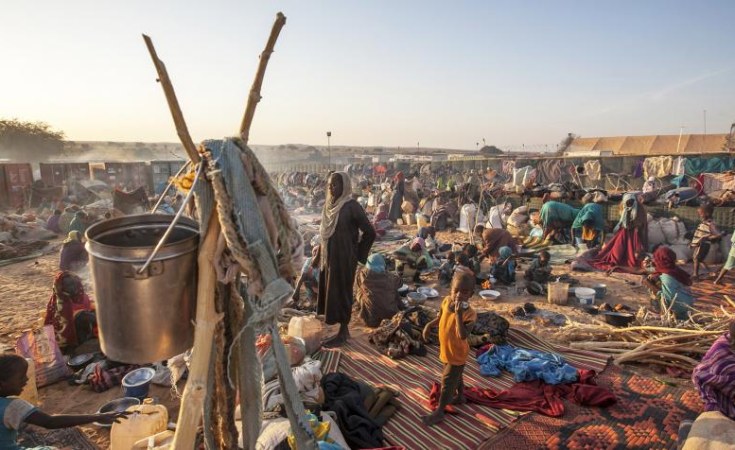The UN has warned of soaring rights violations in Sudan's western Darfur region amid escalating fighting. Witnesses have described a grim scene in the streets and a deteriorating humanitarian crisis.
The United Nations warned Friday of soaring rights violations in Sudan's western Darfur region amid escalating fighting seven months into a conflict between the army and paramilitaries.
More than 800 people have been killed by armed groups in Ardamata in West Darfur, an area that so far has been less affected by the conflict, according to reports cited by the UN refugee agency (UNHCR).
The refugee agency voiced alarm at reports of continued sexual violence, torture, arbitrary killings and extortion of civilians in the region.
Attacks in the village of Abu Hamra in Um Rawaba district, located around 685 kilometers (425 miles) east of Darfur, resulted in the displacement of 76 families, according to the International Organization for Migration (IOM).
One witness described "bodies of people in military uniforms" lying on the streets following the fighting.
Unfolding humanitarian catastrophe
Toby Harward, the UN's deputy humanitarian coordinator for Darfur, said the most recent clashes highlight the intensifying conflict between the army and paramilitaries.
"Hundreds of thousands of civilians and displaced people are now in great danger in El Fasher, North Darfur, with a fast-deteriorating security situation, lack of food and water, and very poor services," Harward said on X, formerly Twitter.
The fighting broke out in April between Abdel Fattah al-Burhan, Sudan's military ruler, and Mohamed Hamdan Dagalo, the leader of the paramilitary Rapid Support Forces (RSF), for control of the country.
The conflict, which extends to Khartoum, Darfur and beyond, has led to widespread displacement and fears of ethnically motivated mass killings.
The war has displaced more than 4.8 million people within Sudan and has forced a further 1.2 million to flee to neighboring countries, according to UN figures.
Essential goods in short supply
Dominique Hyde, a UNHCR official in Sudan, told DW that the conflict and its impact could have been avoided.
"You're talking about 6 million people that have been displaced, both inside Sudan as well as in all of the neighboring countries and that because of a conflict, a conflict that can be stopped," Hyde said.
Mustafa Asim Khalid, a 46-year-old father of four and one of Sudan's internally displaced people (IDPs), said basic necessities are difficult to find.
"We need everything. We need safety. We need peace. We need the necessities of life. Electricity. Water. Food," Khalid told DW. "There is nothing."
The RSF's advance and a communications blackout are exacerbating the shortages.
"If the Rapid Support Forces and the Sudanese army fight for control of the city, it will have a devastating impact on civilians," Haward added on X.
Hyde echoed the same sentiments, indicating that humanitarian support services are stretched.
"The situation is dire. All the UN, [and] the NGO community, is coming together, but it's simply not sufficient for the needs. We are so concerned," Hyde said.
As the crisis unfolds, Hyde highlights the overwhelming conditions at transit centers, which used to be classrooms, now hosting IDPs.
"The transit center is overwhelmed. It was built for three thousand people. It now hosts twenty thousand," Hyde said.
This further underscores the dire state of education. Schools in Sudan have been closed for seven months, with displaced people seeking refuge in classrooms. Hyde stressed the risk to the education and future prospects of millions of children.
Hyde and other people working at the heart of the humanitarian crisis have called for both sides to reach a truce.
"We need a cease-fire. We need a political solution so that these people can go home safely and go back to school, go back to their jobs, and start their lives again. This simply cannot continue," Hyde told DW.
At the end of October, the Sudanese army and its rival paramilitary force resumed mediation talks brokered by the US, Saudi Arabia, the East African IGAD bloc, and the African Union to end the conflict.
A joint statement released on Tuesday after the most recent round of peace talks said that the "co-facilitators regret that the parties were unable to agree on cease-fire implementation arrangements..."
The "belligerent parties also made specific, individual commitments regarding the facilitation of humanitarian access," according to the statement.
Edited by: Keith Walker
This article has been adapted from a report broadcast on DW's AfricaLink, a podcast packed with news, politics, culture and more. You can listen and follow AfricaLink wherever you get your podcasts.


